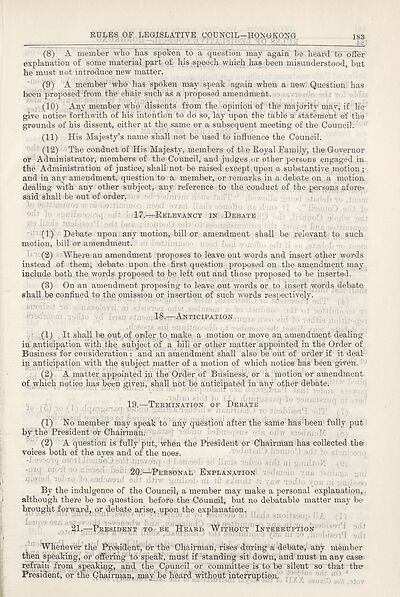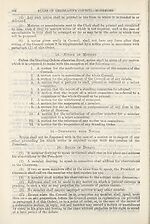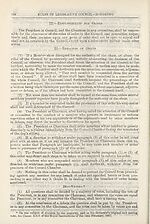1935
(219) Page 183
Download files
Complete book:
Individual page:
Thumbnail gallery: Grid view | List view

RULES OF LEGISLATIVE COUNCIL-HONGKONG. 18^
(8) A member wbo has spoken to a question may again be heard to offer
explanation of some material part of his speech which has been misunderstood, but
he must not introduce new matter.
(9) A member who has spoken may speak again when a new Question has
been proposed from the chair such as a proposed amendment.
(10) Any member who dissents from the opinion of the majority may,1 if he-
give notice forthwith of his intention to do so, lay upon the table! a statement of the
grounds of his dissent, either at the same or a subsequent meeting of the Council.
(11) His Majesty’s name shall not be used to influence the Council.
(12) The conduct of His Majesty, members of the Royal Family, the Governor
or Administrator, members of the Council, and judges nr other persons engaged in
the Administration of justice, shall not be raised except upon a substantive motion;
and in any amendment, question to a member, or remarks in a debate on a motion,
dealing with any other subject, any reference to the conduct of the persons afore¬
said shall be out of order.
17.—Relevancy in Debate
1 (1) Debate upon any motion, bill or amendment shall be relevant to such
motion, bill or amendment.
(2) ; Where an amendment proposes to leave out words and insert other words
instead of them, debate upon the first question proposed on the amendment may
include both the words proposed to be left out and those proposed to be inserted.
(3) On an amendment proposing to leave out words or to insert words debate
shall be confined to the omission or insertion of such words respectively.
18,—Anticipation
(1) .. It. shall be out of order to make a motion or move an amendment dealing
in anticipation with the subject of a bill or other matter appointed in the Order of
Business for consideration : and an amendment shall also be out of order if it deal
in anticipation with the subject matter of a motion of which notice has been given.
(2) A matter appointed in the Order of Business, or a motion or amendment,
of which notice, has been given, shall not be anticipated in any other debater
19. —Termination of Debate
(1) No member may speak to any question after the same has-been fully put
by the President or Chairman.
(2) A question is fully put, when the President or Chairman has collected the-
voices both of the ayes and of the noes.
20. —Personal Explanation
By the indulgence of the Council, a member may make a personal explanation,
although there be no question before the Council, but no debatable matter may be
brought forward, or debate arise, upon the explanation.
21.—President to- be Heard Without Interruption
Whenever the President, dr the Chairman, rises dttring a debate, any member
then speaking, or offering to speak, must if standing sit down, and must in any case
refrain from speaking, and the Cpuncil or committee is to be silent so that the
President, or the C/hairnian, may be heard without interruption.
(8) A member wbo has spoken to a question may again be heard to offer
explanation of some material part of his speech which has been misunderstood, but
he must not introduce new matter.
(9) A member who has spoken may speak again when a new Question has
been proposed from the chair such as a proposed amendment.
(10) Any member who dissents from the opinion of the majority may,1 if he-
give notice forthwith of his intention to do so, lay upon the table! a statement of the
grounds of his dissent, either at the same or a subsequent meeting of the Council.
(11) His Majesty’s name shall not be used to influence the Council.
(12) The conduct of His Majesty, members of the Royal Family, the Governor
or Administrator, members of the Council, and judges nr other persons engaged in
the Administration of justice, shall not be raised except upon a substantive motion;
and in any amendment, question to a member, or remarks in a debate on a motion,
dealing with any other subject, any reference to the conduct of the persons afore¬
said shall be out of order.
17.—Relevancy in Debate
1 (1) Debate upon any motion, bill or amendment shall be relevant to such
motion, bill or amendment.
(2) ; Where an amendment proposes to leave out words and insert other words
instead of them, debate upon the first question proposed on the amendment may
include both the words proposed to be left out and those proposed to be inserted.
(3) On an amendment proposing to leave out words or to insert words debate
shall be confined to the omission or insertion of such words respectively.
18,—Anticipation
(1) .. It. shall be out of order to make a motion or move an amendment dealing
in anticipation with the subject of a bill or other matter appointed in the Order of
Business for consideration : and an amendment shall also be out of order if it deal
in anticipation with the subject matter of a motion of which notice has been given.
(2) A matter appointed in the Order of Business, or a motion or amendment,
of which notice, has been given, shall not be anticipated in any other debater
19. —Termination of Debate
(1) No member may speak to any question after the same has-been fully put
by the President or Chairman.
(2) A question is fully put, when the President or Chairman has collected the-
voices both of the ayes and of the noes.
20. —Personal Explanation
By the indulgence of the Council, a member may make a personal explanation,
although there be no question before the Council, but no debatable matter may be
brought forward, or debate arise, upon the explanation.
21.—President to- be Heard Without Interruption
Whenever the President, dr the Chairman, rises dttring a debate, any member
then speaking, or offering to speak, must if standing sit down, and must in any case
refrain from speaking, and the Cpuncil or committee is to be silent so that the
President, or the C/hairnian, may be heard without interruption.
Set display mode to:
![]() Universal Viewer |
Universal Viewer | ![]() Mirador |
Large image | Transcription
Mirador |
Large image | Transcription
Images and transcriptions on this page, including medium image downloads, may be used under the Creative Commons Attribution 4.0 International Licence unless otherwise stated. ![]()
| Asian directories and chronicles > 1935 > (219) Page 183 |
|---|
| Permanent URL | https://digital.nls.uk/199362492 |
|---|
| Attribution and copyright: |
|
|---|---|
| Description | Volumes from the Asian 'Directory and Chronicle' series covering 1917-1941, but missing 1919 and 1923. Compiled annually from a multiplicity of local sources and research. They provide listings of each country's active corporations, foreign residents and government agencies of all nationalities for that year, together with their addresses. Content includes: various treaties; coverage of conflicts; currencies and taxes; consular fees; weights and measures; public holidays; festivals and traditions. A source of information for both Western states and communities of foreigners living in Asia. Published by Hongkong Daily Press. |
|---|---|
| Shelfmark | H3.86.1303 |
| Additional NLS resources: |

